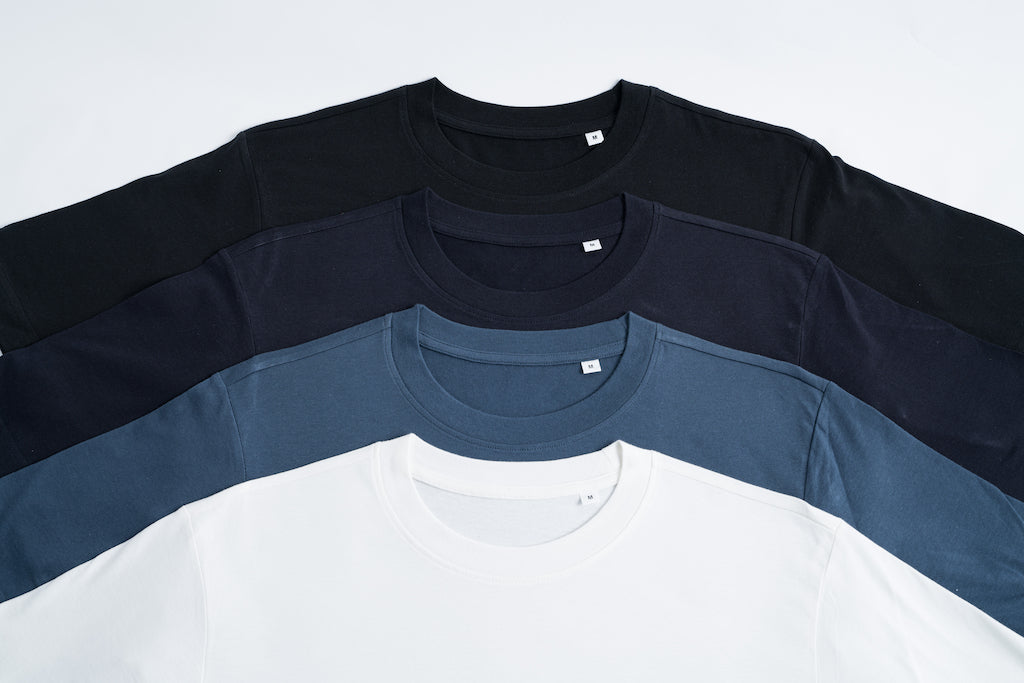Sustainability
Sustainability is no longer just a trend—it’s a necessity and the only way forward. At Sustainable Better Merch, we believe that businesses, bands, and creators can make a difference by choosing eco-friendly merchandise that reduces their environmental impact while still looking great. From organic materials to ethical production, sustainable merch is the future.
But sustainability is about people, too.
The products we offer are not only better for the planet – they’re made with respect for the people behind them. From safe workplaces to fair wages, social sustainability is built into the supply chains we work with.
At Sustainable Better Merch, we are proud to offer the most sustainable clothing on the planet. Our apparel line represents the gold standard in organic, ethical fashion, boasting a 90% reduction in carbon footprint.
Ready to make a positive change? Let’s dive into what sustainable merchandise means and how we help you create eco-conscious products.
A milestone in sustainable fashion
Since the beginning, the products we offer have redefined what it means to produce clothing sustainably. By cutting the carbon footprint the cotton garments by 90%, we’ve proven that fashion can be both stylish and environmentally responsible. Our clothing is more than just apparel—it's a movement toward a healthier planet, showing that it's possible to create quality garments without harming the Earth’s soil, water, wildlife, or climate. The products we offer reflect our commitment to combating the climate crisis, one garment at a time.
Upholding social responsibility
At Sustainable Better Merch, we believe in the fundamental rights of all workers. We ensure safe, healthy working environments, fair wages, legal contracts, and the freedom of association. We do not tolerate child labor, forced labor, or discrimination, and we adhere to reasonable working hours, ensuring our practices align with international standards.
Every piece of clothing that we offer is made under the strictest ethical standards. The factories undergo annual audits to ensure compliance with the Fair Wear Foundation (FWF) Code of Labour Practices, aligned with the International Labour Organisation’s conventions.
Fair Wear Foundation is an independent, non-profit organization whose main focus is improving the textile industry's working conditions. Everyone on this planet has a right to a safe and healthy work environment, to be paid a living wage and to be free from harassment and fair working hours. As a member of the Fair Wear Foundation, the factory must implement a Code of Conduct:
- No use of child labour
- No use of forced labour
- Safe and healthy working conditions
- Legal labour contracts
- Payment of living wage
- Freedom of association and the right to collective bargaining
- No discrimination against employees
- No excessive hours of work
Production sites are regularly audited for social compliance and monitored according to guidelines from the International Labour Organisation, the Ethical Trading Initiative, and other recognised international bodies. Fair Wear also conducts an annual brand performance check for its members, producing a transparent report and score that is publicly available.
Our manufacturing partners follow a Responsible Business Conduct Policy, applying human rights due diligence across their operations and supply chains. This includes formal supplier agreements that commit to responsible business practices, fairness, and long-term stability for workers and suppliers alike.
By choosing these products, you are supporting a supply chain that values people as much as the planet – ensuring safe working conditions, fair pay, and respect for human rights at every stage of production.

Achieving a 90% reduced carbon footprint
Our commitment to sustainability is reflected in the production processes. The garments are made in facilities powered entirely by renewable energy sources and crafted from low-impact raw materials. Between 2007 and 2009, the Carbon Trust in the UK certified that the factory reduced the carbon footprint of our products by approximately 90%, adhering to the PAS2050 standard.
State-of-the-art manufacturing in Tamil Nadu
Our primary manufacturing facility in Tamil Nadu, Southern India, is a beacon of innovation and responsibility. This vertically integrated factory is equipped with cutting-edge technology and infrastructure, setting the benchmark for socially and environmentally conscious garment production. At Sustainable Better Merch, our mission is to deliver high-quality, stylish garments for fashion retail, music merchandise, and corporate promotions, all while upholding our deep-rooted ethical and sustainable values.

Superior yarns and fabrics
The spinning of almost 70% of the yarns used in our garments, ensuring the highest quality and sustainability. The fabrics are knitted and dyed in-house, using GOTS-approved chemicals and low-water processes that meet OekoTex 100 Class I standards and REACH compliance. Our organic fabrics are dyed in a zero-discharge dyehouse, where water is recycled in a closed-loop system.
Leading the way in carbon footprint reduction
The Carbon Reduction Label is placed on all textile products, reflecting our commitment to reducing our carbon footprint. Through innovative design, organic agriculture, and renewable energy, the carbon footprint is cut by around 90%, without relying on carbon offsets. This reduction is certified by the Carbon Trust Certifications in the UK.
For instance, one of our T-shirts saves approximately 7 kilograms of CO2e compared to a conventional one, while a hooded sweatshirt saves up to 28 kilograms. All products proudly carry the “Climate Neutral” mark, symbolizing our achievement in reducing greenhouse gas emissions to pre-industrial levels.

The production process of our organic clothing
Our organic products are ethically made and most importantly manufactured solely using sustainable energy generated from wind and solar power. The garments are made in manufacturing facilities in India powered by wind turbines, from low impact organic cotton under the Global Organic Textile Standard (G.O.T.S) and certified by the Soil Association (UK). G.O.T.S covers the production, processing, manufacturing, packaging, labelling, export, import and distribution to ensure that no harm has been done during the whole process.
Carbon footprint
As a result of using renewable energy and low-impact farming techniques, we have reduced the carbon footprint of our organic shirts by over 89%, while producing the apparel in an ethical and sustainable manner. This proves that it is possible to produce cotton clothing without any detrimental effects on the Earth's soil, water, or inhabitants, whether they be animals, plants or people, or to its climate. Example: The Carbon Trust calculated that without the use of renewable energy, the carbon footprint of the Men's classic organic white t-shirt in size Large would have been 6.574kg CO2; it now stands at 671gwhich represents an 89.79% reduction in CO emissions.

